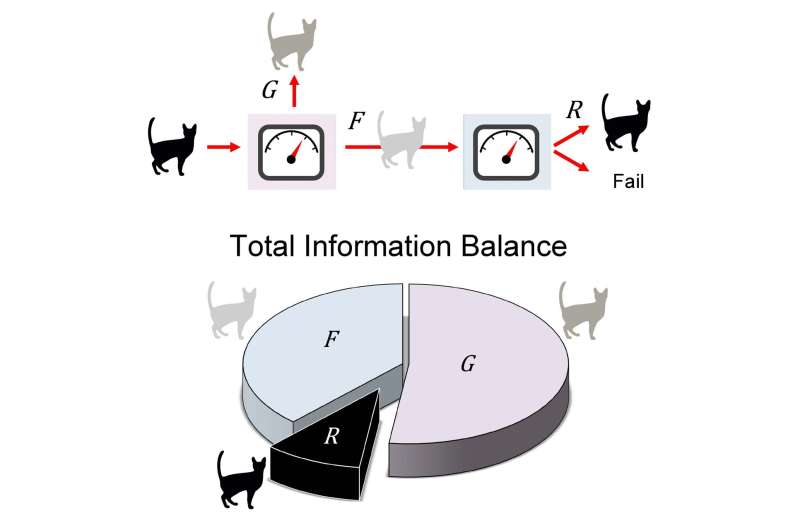Triplewise information tradeoff in quantum measurement has been proved

Schrödinger's cat is a thought experiment designed to explain quantum superposition and quantum measurement, which are the core characteristics of quantum physics. In this experiment, the cat inside the box can be both alive and dead at the same time (quantum superposition), and its state (dead or alive) is decided the moment the box is opened (measured). Such quantum superposition and measurement are not only the foundation of quantum physics, but also guarantee the safety of quantum computing and cryptography.
The research team, comprising Drs. Seongjin Hong, Hyang-Tag Lim, and Seung-Woo Lee from the Center for Quantum Information at the Korea Institute of Science and Technology (KIST, President Seok Jin Yoon), derived and verified the information preservation relation for the first time in quantum measurement. This strengthens the security of quantum information technologies even in the weak quantum measurement realm.
Opening the box (quantum measurement) accommodating the cat to obtain information on whether it is dead or alive changes the initial condition of the cat being both dead and alive at the same time (quantum superposition) to just being either dead or alive. In other words, the cat is dead from the moment we obtain the information of its "being dead," or is alive the moment we obtain the information of its "being alive." Due to the irreversibility of quantum measurements, the cat's state cannot be reversed.
However, what would have happened if the measurement had not been done completely, i.e., if the box had been opened a little bit only to reveal the cat's tail? This event is called weak measurement in quantum mechanics. In this case, complete information on the cat's state cannot be obtained, and the cat's state can be reverted to its initial state using measurement reversal. Therefore, establishing a relation of quantum information preservation by considering the amount of obtained, disturbed and reversible information has been a challenge in quantum physics and also an important task to ensure the security of quantum technology.
The research team theoretically derived an information preservation relation considering the reversing probability along with the existing relations of information gain and state disturbance. This information preservation relation was experimentally verified using linear optical elements such as waveplates and polarizers to implement weak measurement and "reversing operations" and by applying them to a three-dimensional quantum state realized by a single photon. This information preservation relation reveals that obtaining more information on a quantum state by increasing the intensity of measurement disturbs the quantum state more. At the same time, it is also shown that the probability of reversing the disturbed state to its initial state before weak measurement becomes lower. Note that if it were possible to reverse a disturbed quantum state to its initial state, then the safety of quantum cryptography may be not guaranteed.
Drs. Hong and Lim, who led the experiment of this study, and Dr. Lee, who led the theory, say that "this is the result of perfectly establishing that quantum technology is secure in principle by proving that the total amount of information of a quantum state cannot be increased even through measurement. We expect this to be applied as an optimization technology for quantum computing, quantum cryptography, and quantum teleportation."
The research was published in Physical Review Letters.
More information: Seongjin Hong et al, Demonstration of Complete Information Trade-Off in Quantum Measurement, Physical Review Letters (2022). DOI: 10.1103/PhysRevLett.128.050401
Journal information: Physical Review Letters
Provided by National Research Council of Science & Technology



















